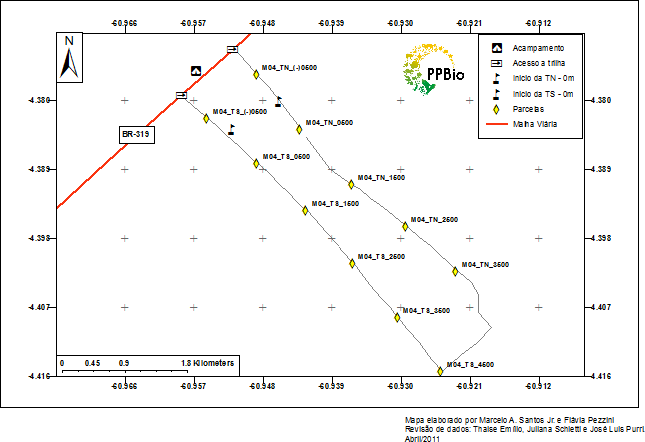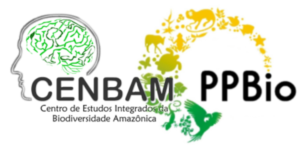Languages
Infrastruture KM 220 Module
Access
The conditions of the road to the module are reasonable until the bridge of Tupana, after the crossing it is recommended to use a traction car. From Manaus there are approximately 220 km of paved road with holes, interspersed with some stretches of land. It is necessary to cross the Ceasa ferry in Manaus (R $ 35.00) to reach the module.
Conditions of the trails and camps
The trails were opened in 2007, cleaned in 2009 and have not been cleaned since. There is currently no camp in module 04 as it was hit by the large fires that occurred in 2015 in the region. Before scheduling your visit, contact Gerencia.ppbio@gmail.com regarding camp conditions and availability. In this module, the first plot on each of the trails is located 500m from the road, so it is agreed to call it (-500).

What's nearby?
For those leaving Manaus towards Porto Velho, the M04 is 27 km after the Tupana river bridge. The trail leading to the camp is on the right side of the track (opposite the module) and is accessed by a pinguela located after a manhole about 500m after the Embratel tower (Levi). The north track of the module can be accessed through a capoeira located about 300m before the Levi tower, on the left side of the track. The southern trail is approximately 1 km towards Porto Velho and is identified by a pipe with pink ribbon. The entrance to the two trails is quite difficult to find by people who have never visited the site, if this is your case, load the entry points of the trails and camp on your GPS before visiting the module.
Where to get water?
In M04 there is a well without a wooden box dug at the bottom of the camp, at the edge of a temporary stream. During the dry season, the well and the stream dry and there is no guarantee of drinking water in the vicinity. When present, water from the well should be treated with some type of disinfectant (such as chlorine) whenever used for drinking or cooking. It is recommended to take chlorine to play directly in the well as it is left unused for long periods and there may be proliferation of insects. If you are going to use the well water to bathe, remember to do this away from the well box to avoid water contamination. Also, keep the well closed. The igarapé can also be used for bathing and washing dishes, but it is not recommended due to the presence of alligators. In the most critical periods of drought, a marginal lagoon located about 300m from the camp in the tower direction for bathing and washing dishes can be used. As this water remains standing for a long time, it is not recommended to drink it even when treated. In this case, drinking water for drinking and cooking must be brought from the city or another nearby module.
Local staff
In the vicinity of the M04 there are no permanent residents, so if you are going to need someone you must bring them from another location. There are several people in Castanho who have already provided some type of service for the project and you can consult the other researchers who have already worked in the region for indications.
If you need help
If it is necessary to go in search of provisions and telephone contact, the options are the municipality of Careiro-Castanho (90 km towards Manaus) and the Igapó-Açu community (50 km towards Porto Velho). In addition, at Embratel's tower (500m before the camp in the direction of Manaus), if there are any employees, it is possible to have access to a telephone for external calls or a radio for communication between towers. In the municipality of Careiro-Castanho there are some grocery stores, fruit and vegetable stands, public telephones, gas station, post office, lan-house, restaurants, snack bars, pharmacy, hospital, police station, Bradesco bank, hardware store. construction and agriculture, etc. The cellular signal from Vivo and Claro also works, but not always. Tax invoice and coupon can be obtained for some products and services if you are not in a hurry and very patient. Although closer to the module, the travel time to the Igapó-Açu community may be longer than the travel time to the municipality of Careiro-Castanho (where access to telephone and groceries is guaranteed) due to road conditions. In the Igapó-Açu community it is possible to buy basic foods (rice, beans, flour, sugar, coffee and fish), there is a public telephone (which does not always work), but there is nowhere to buy a phone card. At igapó-açu, groceries are sold before and after crossing the Igapó-Açu river. The products are obviously more expensive than normal and tax receipts cannot be obtained. The public telephone (0219244007682) is after the crossing. On the other side, on the left bank, there is a restaurant and two options for staying overnight: one is the straw hat of the community that next to the pay phone and can be used free of charge; the other option is the accommodation of Seu Raimundo, which is next to the restaurant (a green house just above the ferry landing). If using the straw hat, the use of mosquito nets is recommended, as there are many cases of malaria in the Igapó-Açu community.
Term of commitment and rules of conduct
Before going to the field, you must download, read and sign the Term of Commitment and Standards of Conduct of BR-319 and send it to the PPBio Management at email gerencia.ppbio@gmail.com.

Download the official GIS with all points along the BR-319: Shapefiles Modules BR-319
Contact:
Gerência PPBio
Coordenação de Pesquisas em Ecologia
Instituto Nacional de Pesquisas da Amazônia

